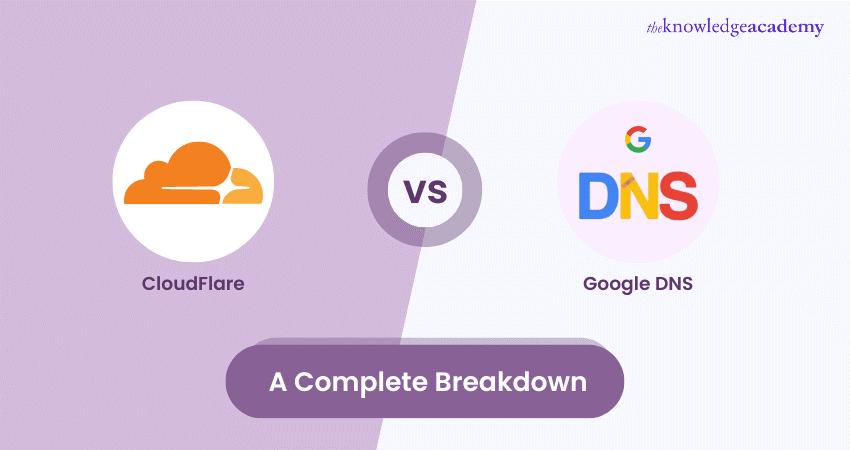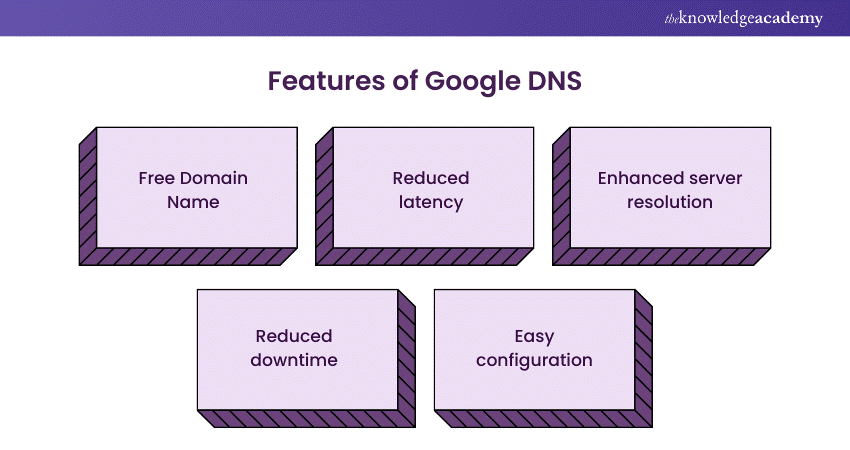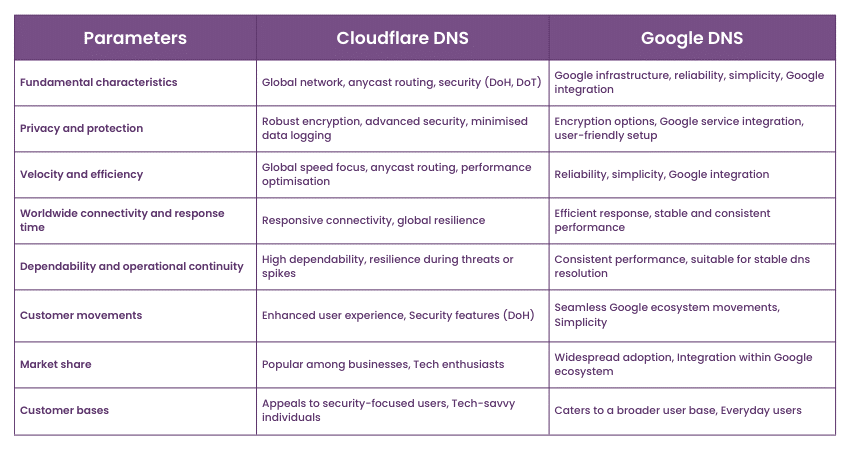We may not have the course you’re looking for. If you enquire or give us a call on 01344203999 and speak to our training experts, we may still be able to help with your training requirements.
Training Outcomes Within Your Budget!
We ensure quality, budget-alignment, and timely delivery by our expert instructors.

Making the choice between Cloudflare vs Google DNS is pivotal, which makes it very crucial that you understand the strength and differences between these two DNS giants. Cloudflare, renowned for its global network and security prowess, faces off against Google DNS, backed by simplicity and integration into the Google ecosystem.
More importantly, understanding the nuances in fundamental characteristics, privacy measures, velocity, and reliability, this breakdown empowers users to make an informed decision in the CloudFlare vs Google DNS dilemma, ensuring an enhanced online experience tailored to their specific preferences and priorities.
Table of Contents
1) What is a Cloudflare?
2) What is Google DNS?
3) Difference between Cloudflare and Google DNS
a) Fundamental characteristics
b) Privacy and protection
c) Velocity and efficiency
d) Worldwide connectivity and response time
e) Dependability and operational continuity
f) Customer movements
g) Market share
h) Customer bases
4) Conclusion
What is a Cloudflare?
Cloudflare is a prominent and versatile internet security and performance company that provides a suite of services designed to enhance the reliability, speed, and security of websites. Founded in 2009, Cloudflare has evolved into a global leader, offering a range of solutions that cater to the diverse needs of website owners, businesses, and online platforms.
At its core, Cloudflare operates as a Content Delivery Network (CDN), strategically distributing website content across a vast network of servers worldwide. This not only accelerates the delivery of web pages but also mitigates the impact of DDoS attacks, ensuring consistent and secure access for users.
One of Cloudflare's standout features is its DNS service, which acts as a crucial intermediary between users and the internet. By leveraging an expansive network of servers strategically positioned across the globe, Cloudflare's DNS service enhances the speed and reliability of domain name resolution.
Additionally, Cloudflare prioritises security, offering advanced protection against cyber threats such as malware, bot attacks, and other online vulnerabilities.
Furthermore, Cloudflare has extended its commitment to privacy through initiatives like DNS over HTTPS (DoH) and DNS over TLS (DoT), ensuring that user data remains confidential during the DNS resolution process.
In essence, Cloudflare plays a pivotal role in optimising the performance and security of the internet, making it an integral partner for websites seeking a resilient and protected online presence.
What is Google DNS?

Google DNS, or Google Public DNS, is a free Domain Name System (DNS) resolution service offered by Google. Launched in 2009, Google DNS aims to improve users' internet experience by providing a fast, reliable, and secure way to translate domain names into IP addresses.
Google DNS operates on a global network of servers, strategically distributed to reduce latency and enhance the speed of DNS resolution. By leveraging Google's extensive infrastructure, the service aims to minimise the time it takes for users to access websites, ultimately optimising their online experience.
One of the key features of Google DNS is its simplicity. Users can easily configure their devices to use Google DNS, and the service boasts a user-friendly setup process. The service also emphasises security by supporting encryption protocols like DNS over HTTPS (DoH) and DNS over TLS (DoT), ensuring that the communication between users and the DNS server remains private and secure.
Google DNS has gained popularity not only for its speed and reliability but also for its integration with other Google services, providing a seamless experience for users within the Google ecosystem. As a result, Google DNS stands as an accessible choice for individuals and organisations seeking a trustworthy DNS resolution service.
Master the art of running and managing servers by signing up for our BIND DNS Administration Training now!
Difference between Cloudflare and Google DNS
Cloudflare and Google DNS are DNS resolution services with distinct strengths. Cloudflare focuses on speed, security, and a global network. It integrates features like DNS over HTTPS. Google DNS prioritises simplicity, leveraging Google's infrastructure for reliability.
It emphasises ease of use and integrates seamlessly with other Google services. Here are the key distinctions described in-detail:
a) Fundamental characteristics
Cloudflare DNS is renowned for its global network, emphasising speed and security with features like Anycast routing and robust encryption protocols. It prioritises performance optimisation and advanced security measures against cyber threats.
Google DNS, on the other hand, stands out for its simplicity and integration with Google services. Leveraging Google's infrastructure, it offers reliable DNS resolution with user-friendly setup.
It focuses on ease of use while supporting encryption protocols like DNS over HTTPS, ensuring a secure and private online experience. Both services provide unique strengths, catering to users with diverse preferences and priorities in DNS resolution.
b) Privacy and protection
Cloudflare DNS and Google DNS exhibit differences in privacy and protection. Cloudflare emphasises security with advanced features like DNS over HTTPS and DNS over TLS, enhancing data encryption during DNS resolution. It prioritises user privacy by minimising data logging and employing robust security measures against cyber threats.
On the other hand, Google DNS, while offering encryption options, integrates with other Google services, potentially raising privacy concerns related to data sharing within the Google ecosystem. Users must weigh the simplicity and reliability of Google DNS against their privacy preferences. Both services prioritise security, but the approach to privacy underscores their differences in handling the user data.
Detect and mitigate ransomware attacks by signing up for our Security and Privacy in Internet Of Things (IoT) Training now!
c) Velocity and efficiency
Cloudflare DNS and Google DNS differ in their approach to velocity and efficiency. Cloudflare is renowned for its global network and Anycast routing, prioritising speed in DNS resolution. With a focus on optimising internet performance, Cloudflare aims to minimise latency, providing users with swift access to websites.
Google DNS, leveraging Google's extensive infrastructure, emphasises reliability and simplicity. While it offers efficient DNS resolution, Google DNS integrates seamlessly with other Google services, contributing to a cohesive user experience.
The difference lie in Cloudflare's emphasis on global speed and efficiency and Google DNS's focus on reliability and integration within the broader Google ecosystem
d) Worldwide connectivity and response time
Cloudflare DNS and Google DNS shows difference in worldwide connectivity and response time. Cloudflare, with its globally distributed network and Anycast routing, excels in providing swift response times by minimising latency across diverse geographical locations. This ensures a responsive and interconnected DNS infrastructure.
Google DNS, leveraging Google's vast infrastructure, offers reliable worldwide connectivity with efficient response times. While it may not match Cloudflare's global speed, it prioritises stable and consistent performance.
Moreover, users must weigh Cloudflare's emphasis on rapid response against Google DNS's reliable connectivity, aligning their preference with either global speed or consistent efficiency based on their specific needs.
e) Dependability and operational continuity
Cloudflare DNS and Google DNS are different in terms of dependability and operational continuity. Cloudflare, with its robust global network and Anycast routing, emphasises high dependability, ensuring operational continuity even during traffic surges or cyber threats. It excels in maintaining service availability under challenging conditions.
Google DNS, leveraging Google's extensive infrastructure, prioritises operational continuity with a reliable and consistent performance. While it may not match Cloudflare's global resilience, Google DNS offers stable dependability, particularly suitable for users seeking a consistent and reliable DNS resolution service. Users should consider their specific needs and priorities when deciding between the two based on dependability and operational continuity.
f) Customer movements
Cloudflare DNS and Google DNS differ in their impact on customer movements. Cloudflare, with its emphasis on speed and global performance, can enhance the user experience by minimising latency, resulting in smoother online interactions. Its focus on security features, such as DNS over HTTPS, can contribute to a more secure browsing environment.
Google DNS, with its integration into the broader Google ecosystem, may facilitate seamless movements for users within Google services. Its simplicity and reliability contribute to a user-friendly experience. Ultimately, the differences lie in Cloudflare's emphasis on performance, while Google DNS prioritises ease of use and integration within the Google environment for customer movements.
g) Market share
Cloudflare, known for its focus on security and performance, has gained popularity among users seeking robust protection and optimised internet speeds. It has carved a significant market share, particularly among businesses and tech-savvy users.
Google DNS, backed by the tech giant's reputation, holds a substantial market share, owing to its simplicity and seamless integration with other Google services. Its widespread adoption among everyday users contributes to its significant presence in the DNS service domain. The distinctions in market share reflect the varied preferences and needs of users.
h) Customer bases
Cloudflare attracts a customer base seeking advanced security features, global performance optimisation, and reliability, making it popular among businesses and tech enthusiasts. Its customer base often values the robust protection against cyber threats and enhanced internet speeds.
Google DNS, with its seamless integration into the Google ecosystem, caters to a broader customer base, including everyday users and those looking for a user-friendly, reliable DNS solution. Its simplicity aligns with the preferences of a diverse range of users, contributing to a widespread adoption among individuals and organisations.
Here are the above distinctions described at a glance in the table below:

Master firewall operations and identify automated traffic by signing up for our CloudFlare Training now!
Conclusion
We hope that you have understood the differences between CloudFlare vs Google DNS, where Cloudflare excels in speed and security, while Google DNS offers simplicity and seamless integration. Users, considering factors like reliability and privacy, can make an informed decision based on their unique needs in the CloudFlare vs Google DNS debate.
Frequently Asked Questions
Upcoming IT Infrastructure & Networking Resources Batches & Dates
Date
 CloudFlare Training
CloudFlare Training
Fri 27th Dec 2024
Fri 24th Jan 2025
Fri 28th Mar 2025
Fri 23rd May 2025
Fri 25th Jul 2025
Fri 26th Sep 2025
Fri 28th Nov 2025







 Top Rated Course
Top Rated Course



 If you wish to make any changes to your course, please
If you wish to make any changes to your course, please


